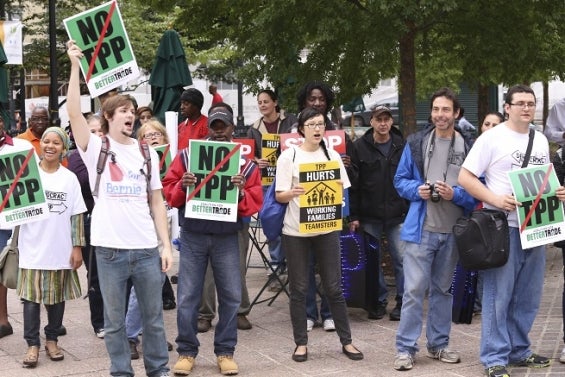Headline News
Hoffa: Keep Trade Reform Efforts Alive

By Teamsters General President James P. Hoffa
Published in the Detroit News, Feb. 1, 2017
Workers across Michigan and the nation got some good news last week when President Trump applied the official death knell to the terrible Trans-Pacific Partnership, which would have shipped thousands of jobs overseas while tamping down on wages at home.
It was the culmination of years of work by the Teamsters, other unions and fair trade advocates worried about the future of U.S. jobs, the environment, food safety and foreign corporate intervention in lawmaking in this country. Those parties, joined by a bipartisan coalition in Congress, fought to raise public awareness and ultimately brought the proposed 12-nation Pacific Rim trade deal to a halt.
The victory should be celebrated. But it cannot be the end of the effort to make this nation’s trade policy fairer for tens of millions of working Americans. As President Trump has noted himself, there is a need to rework the existing North American Free Trade Agreement to make it a tool that raise wages and protects working conditions across the continent.
To that end, there is a need to end incentives for non-U.S. production that eliminate jobs and push down wages. The offshoring of jobs can be curbed through stronger enforcement of trade deal rules. New provisions are also needed addressing currency management, labor and the environment, while rules undermining this country’s “Buy American” federal procurement program should be discarded.
One proposal that could help United Auto Worker members in Michigan would be an upgrade in NAFTA’s rules of origin pertaining to autos and auto parts. By raising NAFTA standards above the current 62.5 percent North American-made requirement to qualify for duty-free treatment, the U.S., Canada and Mexico would create a more robust labor market that would help North American workers benefit from trade.
But other changes would benefit the entire nation, such as upgrading safety requirements when it comes to cross-border trucking services. NAFTA requires the U.S. to allow Mexican and Canadian trucks to operate here even if those vehicles don’t meet American safety and environmental standards and operators don’t hold U.S. commercial driver’s licenses. Standards need to be improved so highway users aren’t put at risk.
Fixes are needed in NAFTA’s investment chapter, which includes a private arbitration system established for foreign investors. The controversial “investor-state dispute settlement” was a big reason for the TPP’s downfall and must be eliminated in an improve NAFTA. Investors should not be able to challenge local, state and federal laws that they believe curb corporate profits. Scrapping the system would help level the playing field for U.S. producers and their employees.
And any reformed North America trade deal must address currency manipulation through enforcement and sanctions. Mexico devalued the peso in the wake of NAFTA’s enactment, making imports from the country far cheaper than they would have been otherwise. Binding rules must be created to prevent such a gaming of the system.
The Teamsters are in favor of trade, but it has to benefit workers, not just corporations. Revamping trade policy won’t fix everything – there is a great need to reform pensions to improve retirement security nationwide, for example. But it is a significant step that will raise worker wages and bring stability for millions of hard-working Americans trying their best to support their families. That is the way to improve this country for the people.